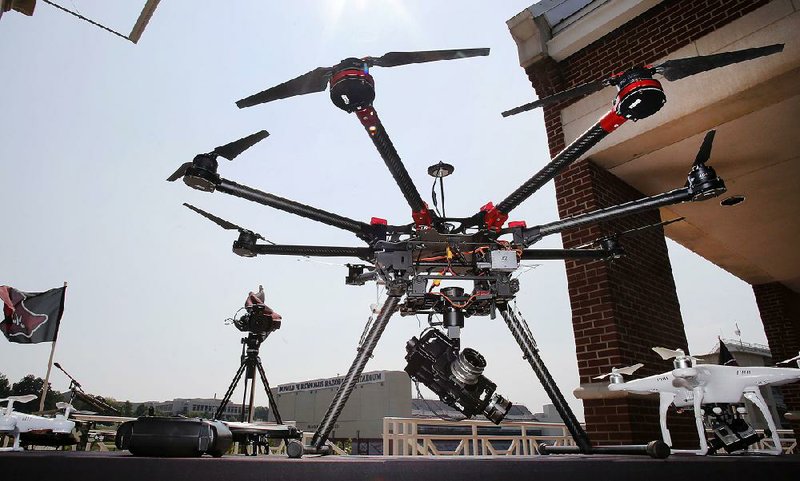FAYETTEVILLE -- After having unauthorized drones fly over two separate university events, the University of Arkansas at Fayetteville announced Monday a new policy prohibiting the use of unmanned aircraft systems without written permission from the university.
In citing safety concerns, UA released video from 2013 taken by a drone that crashed near Old Main, the university's oldest building. The drone operator had been paid by UA to take aerial footage of the campus landmark. No one was hurt, according to the university.
Capt. Gary Crain with university police said a drone this year flew over an Arkansas Razorbacks baseball game at Baum Stadium. A drone also flew above the university's traditional freshman pep rally, held Thursday at Donald W. Reynolds Razorback Stadium, Crain said.
Both cases involved individuals who stopped flying the drones when asked by authorities, Crain said. With the new policy, Crain said drone pilots would be first asked to stop flying and to not fly over the campus again. A second offense could result in a criminal trespass warning and being forced to leave campus, Crain said. UA released a statement Monday that violations could also result in arrest.
The use of drones "poses inherent health, security, and privacy risks to the University community," the policy states. At the same time, the policy outlines a process by which drone operators may fly on campus.
"Primarily, that's going to be for research or commercial activities," university spokesman Mark Rushing said, describing "a very limited availability" for such approvals. One such approval has been granted for a student-based organization, the Residents' Interhall Congress, to work with a drone operator, Rushing said.
Zak Heald, owner of IP Film and Video in Rogers, said he worked with the student group to make a promotional video, sending a 3-foot-wide drone weighing approximately 10 pounds into the sky Saturday to shoot video of Old Main.
Either UA's top academic and research officials or -- for athletics-related requests -- the Razorback athletic director will review requests for drone use, the policy states. So far, no requests have been made to the Razorback athletic department, said university spokesman Kevin Trainor.
The UA policy refers to the university's "'air rights' recognized by federal or state law."
However, Federal Aviation Administration spokesman Les Dorr called it an "open question" as to whether a university has broad authority over the skies above its campus.
Dorr said a university can prohibit a person on campus from launching an unmanned aircraft. But, in general, "the federal government has authority over the airspace," he said.
Elsewhere, various lawmaking bodies have rushed to enact regulations on drone use.
"Typically, that would be a state or municipal law," Dorr said, with federal authorities reviewing such laws to see if federal law pre-empts any restrictions.
Rushing, the UA spokesman, referenced a state law describing ownership of "the space over and above the lands and waters of this state" to be "vested in the owner of the surface beneath."
The same law -- Arkansas Code Annotated 27-116-102 -- also states that flight in aircraft is lawful unless it interferes with land use or is "so conducted" as to be "dangerous or damaging to persons or property lawfully on the land or water beneath."
Brian Wynne, president and chief executive officer of the Association for Unmanned Vehicle Systems International, in a written statement referred to the importance of forthcoming rules from the FAA on drones.
The low cost of such unmanned systems has allowed thousands of hobbyists to take to the skies, though prohibitions exist on flying over people, for example. Meanwhile, Dorr said about 1,500 exemptions have been granted by the FAA to pilots seeking to fly drones for commercial purposes, or at least for reasons other than as a hobby.
"Until the FAA finalizes its long awaited rules on small unmanned aircraft systems, there is much uncertainty about where operators should and should not fly and for what purpose," Wynne said.
Arkansas lawmakers took up the issue of drones this year, with Rep. Justin Harris authoring and then withdrawing a bill that would have established a misdemeanor criminal penalty for someone using a drone to capture images on private property without "express consent" of a property owner.
Ultimately, the Arkansas Legislature and Gov. Asa Hutchinson approved a law related to an existing statute prohibiting voyeurism. The new law prohibits the use of a drone to secretly capture video or images without consent of the person being recorded.
The university policy refers to unmanned aircraft systems as "UAS," stating that "use of University property or air rights for the purpose of operating any UAS or model aircraft is prohibited at all times, except as approved in advance."
Auburn University adopted a policy that took effect last October prohibiting unauthorized flying of drones on campus during football game days.
Federal regulations prohibit unauthorized drones from flying over NCAA college football games in stadiums that seat 30,000 or more fans, such as both Donald W. Reynolds Razorback Stadium and War Memorial Stadium in Little Rock, which hosts a Razorback football game.
Metro on 09/01/2015
